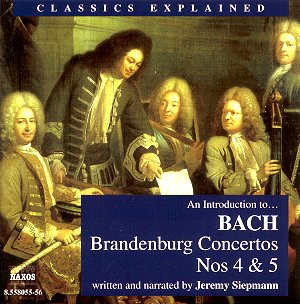Jeremy Siepmann has already completed several of these skilfully
planned recordings of musical masterworks under the microscope, not unlike
the popular BBC Radio 3 series 'Discovering Music'.
This pair of well filled CDs explores two of Bach's
greatest works, the Fourth and Fifth Brandenburg Concertos. There is
a brief introduction in which Siepmann places the Brandenburgs in context,
quoting from various sources, before embarking upon quite a thorough
motivic examination of the music. In these endeavours he is supported
by a quite excellent accompanying booklet, which is thorough, well organised
and clearly planned. However, some pretty fundamental material is either
omitted or extremely difficult to locate, which amounts to the same
thing. There is precious little material about the performers or the
performances - and complete performances are involved - and the musicians
deserve more acknowledgement than this.
Siepmann knows his way around the music and he understands
its context. These things are not to be taken for granted, nor are they
easily achieved. He is also an able narrator, even if his style seems
occasionally to be mannered. The text of the descriptions is included,
but it is disappointing that bar and cue numbers for those with scores
have not been included alongside in the margin of the booklet notes.
For without these references the points of analysis tend to fall over
one another. It is rather like attending an evening class adult education
lecture, but without the flexibility of a lecturer responding to his
audience: a bit like a comedy show without the jokes, to put it crudely.
Given the attention to detail in so much of the production, the lack
of reference to the score is disappointing. Not everyone will want to
go in this direction, but why not offer the opportunity.
The analysis is accurate and fluently delivered, and
there is never a doubt that the salient features of the music are being
discussed. But sometimes, particularly in the first movement of No.
4, the analytical points fall over one another and the impact is lost.
The performances are reliable enough, even if the Cologne
Ensemble have not established themselves as leaders in the field - nor
are they likely to do so. There is no attempt at uncovering the niceties
of authentic performance, since it is assumed that the music will be
always as it is heard on these discs. But overall the strengths outweigh
the weaknesses. Although these discs are unlikely to become regular
listening, they are well worth hearing for the musical secrets that
they uncover.
Terry Barfoot


